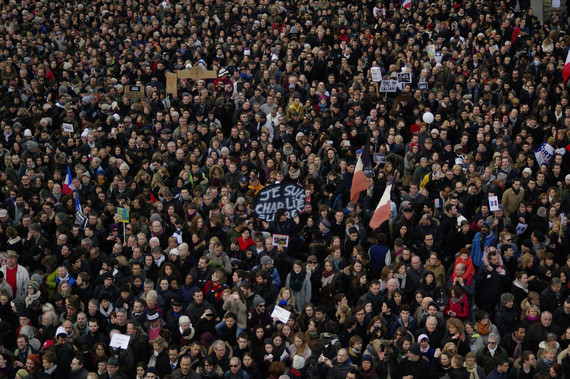We cannot sight the Charlie Hebdo incident and refrain from all comment. But it would be redundant to revisit here the obvious aspects of the incident.
Obviously, the murderers at the office of the French satirical magazine were simply evil.
Obviously, the killers were motivated by their obsession with their version of Islam to do the evil act.
Obviously, haters of Islam could be counted on immediately to call for hateful counteraction. They did not disappoint.
Obviously, obsessive critics could be expected to trace all the evils to "their" holy book and to discount descriptions of and calls for holy wars in other people's holy books. What was expected has occurred.
Obviously, anyone who spoke up for patience, tolerance, understanding, and positive responses to the evil had to be ready to be dismissed as vapid, naïve, and blind excusers of evil.
Five obviouslys should suffice. Some other voices revealed how difficult it is to go beyond the obvious, but they tried. The most interesting of these were those that addressed some rationales and motives of the killers and their spiritual kin. Bill Donohue of the Catholic League issued a release titled, "Muslims Are Right to Be Angry." To the point: "We" should not "tolerate the kind of intolerance that provoked this violent reaction," he wrote. Donohue was predictable, but one can understand his emotional response.
Charlie Hebdo wanted to taunt and outrage believers in faiths other than Islam, notably Judaism and Catholicism, both of which have their own defense leagues. You don't have to be a Catholic to be offended by the paper's cartoons picturing nuns masturbating or popes wearing condoms.
Rabbi David Lerner of Tikkun took a different tack: The incident should remind "us" in the West of other kinds of dehumanizing in our media. Alas, "[w]e tolerate the kind of endless put-downs that the 'humor' magazines and even supposedly liberal comedians like Bill Maher perpetrate, not realizing how much damage all of this does to our souls," he wrote.
Becoming concerned with evils that do damage to our souls might be one positive way to come out of a crisis in which we measure "their" evils against ours. Anyone who reads comment-section responses to Internet coverage of this topic will encounter myriad vengeful, hateful, and blasphemous verbal swings at reverent citizens minding their own business. Some who comment do express proper gratitude for the nonlethal (or at least less-lethal) expressions and credit Western democracy with providing us with forums that protect blasphemers.
The moment calls for new appreciation for those polities we enjoy that have encouraged intergroup civility, threatened though that may be in these days of hyperpolarization. But people in our citing and commenting vocations can also use the moment to recalibrate our measures of outrage.
In 1988, when we were chartered to begin a multi-volume, multi-year, multi-religious study of fundamentalisms, a historian of the domestic versions of such helpfully reminded us editors that, as we study militant and belligerent religious movements and forces, we should remember that "there are no guns or bombs stored in the basement of Moody Bible Institute." The Moody Bible Institute, a stronghold of latter-day American now-moderating fundamentalisms, is visible from my windows. I have never felt threatened and do feel welcomed.
"We" cannot solve all the problems at the core of the present tragedy, but those who ask us to begin at home to promote understanding do serve the cause. They may sound weak. They are strong.
An earlier version of this blog post appeared on Sightings, an online publication of the Martin Marty Center for the Advanced Study of Religion at the University of Chicago Divinity School. This post is not available for republication without the consent of Sightings. Please contact Managing Editor Myriam Renaud at DivSightings@gmail.com.
